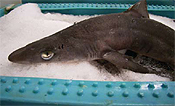Sharks in the Baltic
New report examines 31 species of sharks and related species under threat in the Baltic Sea

Stockholm – A new report on the 31 species of sharks and related species in the Baltic Sea from the Shark Alliance highlights the threats to these over-looked fish and calls for improved conservation policies.
The report documents the distribution and status of 31 species sharks, rays and chimaeras (collectively known as cartilaginous fishes) in the Baltic and transitional areas, details how current safeguards are insufficient in the face of current fishing and environmental pressures, and outlines recommendations for the governments of Baltic countries, particularly EU Member States.
“Sharks are here and the only thing to fear is losing them forever,” said Sonja Fordham, Policy Director for the Shark Alliance and co-author of the report. “Sharks and related species are poorly studied and inadequately protected throughout most European waters, and our analysis reveals that these failings are even more severe for the Baltic region. Improvements are possible through expanding existing protections and ensuring that the final EU Plan of Action for Sharks is strong,” continued Fordham.
Whereas most existing EU management measures for sharks and rays exclude the Baltic, Sweden protects many of these species through national regulations. With its lengthy coast and position on the salty end of the Baltic, Sweden is home to most of the 31 cartilaginous fishes found in the Sea and has had higher catches of them than other bordering countries. Nearly half of the shark species reported from Swedish waters are considered by IUCN to be threatened with extinction.
“At least fifteen species of sharks – from the swift and powerful porbeagle to the docile, bottom-dwelling catshark – have been found in Swedish waters,” said Dr. Sven Kullander, report co-author and senior curator of ichthyology at the Swedish Museum of Natural History in Stockholm. “These fish represent the fringe of species’ range, rather than separate populations, but reflect and contribute to overall population health. Further research is needed for a more complete picture of many species’ status and conservation needs. In the meantime, their tendency to grow slowly, mature late and produce few young argues for precautionary protections.”
Sweden is in fact the only Baltic country to adopt national rules to protect sharks and rays. Swedish officials have demonstrated interest in the development of the EU Shark Action Plan. With the EU Presidency in the latter half of 2009, Sweden is likely to preside over key decisions in the implementation of this long-awaited plan. More immediately, inconsistencies and loopholes in shark fishing limits affecting Swedish vessels demand attention.
“Interest in sharks among Swedes is growing, as are the government’s opportunities to lead the EU toward responsible shark conservation,” said David Bernvi, President of the Swedish Elasmobranch Society and author of two books on sharks who leads Swedish eco-tourism trips to see sharks off Africa. “Sweden is well-positioned to encourage the European Commission to produce a solid final shark plan and to ensure that the plan’s elements are fully implemented. Sweden should begin work now to tighten regional limits for endangered species by 2009. These actions will reflect the conservation ethic and appreciation of sharks that is demonstrated by the Swedish people.”
Notes to Editors:
The Shark Alliance is a coalition of over 50 non-governmental organizations dedicated to restoring and conserving shark populations by improving European fishing policy.
The Shark Alliance is urging all Baltic country governments to:
- promote science-based shark and ray fishing limits and protection for endangered species;
- improve the monitoring and assessment of Baltic shark and ray populations;
- facilitate research into effects on cartilaginous fish from Baltic fisheries, salinity and anoxia;
- promote attention to sharks and rays under international treaties and regional bodies;
- take a stand for closing loopholes in the EU finning ban and its national enforcement; and
- engage in developing and implementing a sound European Plan of Action for Sharks.
In addition, the Shark Alliance is calling specifically on Sweden to:
- ensure fishing limits for Critically Endangered spurdog in the Baltic are reinstated by 2009, and
- relinquish their EU quota share for porbeagle sharks and work to end targeted fishing for this Critically Endangered species through a strict EU limit by 2009.
The European Commission will complete an EU Plan of Action for Sharks by December 2008. This plan can set the stage for sound fishing limits, endangered species protection, and a stronger finning ban, but support from conservation-minded Member States is needed to balance opposition from fishing interests.






